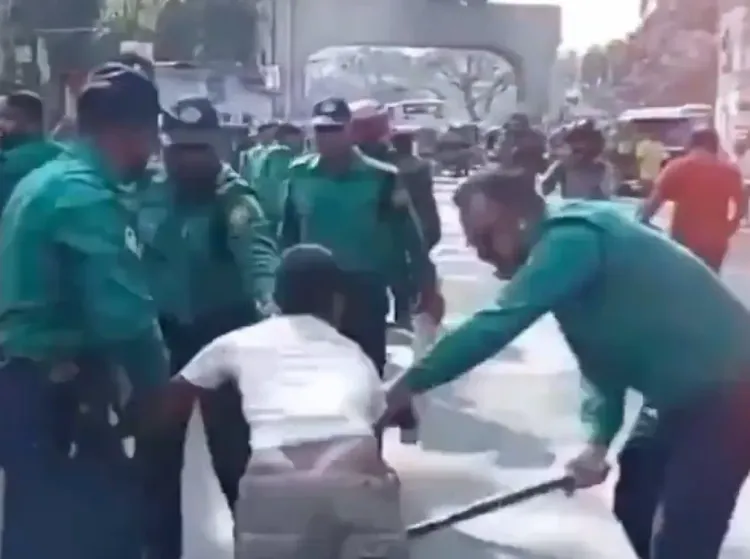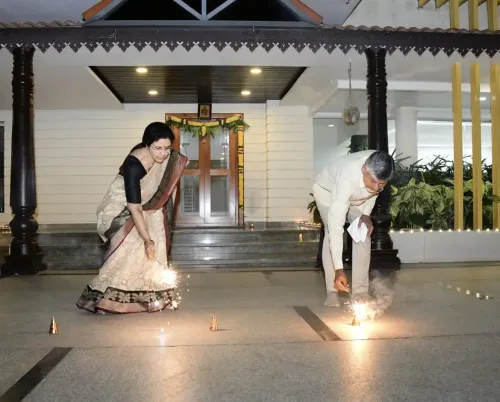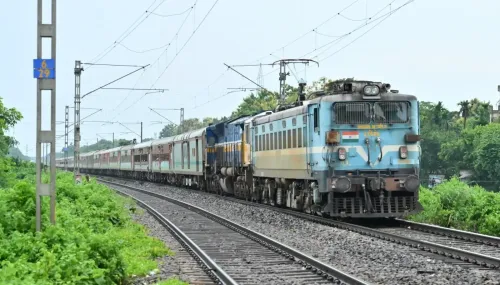Bangladesh: Violent Clash Leaves Workers Injured Amid Protest for Unpaid Wages

Synopsis
Key Takeaways
- Workers injured in clashes with police in Dhaka.
- Protests demand unpaid wages and bonuses.
- Workers vow to continue protests until their demands are met.
- Thousands blocked highways, causing significant traffic disruption.
- Ongoing protests have led to factory closures.
Dhaka, March 25 (NationPress) A number of garment workers sustained injuries on Tuesday during a violent encounter with police in the capital of Bangladesh as they attempted to advance towards the Secretariat from Shrom Bhaban. Workers from various factories across the country had been conducting a sit-in at Shrom Bhaban in Dhaka for three consecutive days, advocating for their unpaid wages, as reported by local media.
The injured individuals were subsequently transported to Dhaka Medical College Hospital (DMCH) for medical attention.
"Before the workers could even approach the barricade, police unleashed tear gas and charged at them with batons to disperse the crowd. When the workers sought to regroup, police intervened once more, resulting in a brief chase. I personally escorted seven or eight workers to the hospital, but the actual number of injuries is significantly higher," stated Sadequl Rahman Shamim, General Secretary of the Garment Workers Trade Union Centre, in an interview with Bangladeshi news outlet BDnews24.
Another leader from the Bangladesh Garments and Sweaters Workers Union cautioned that if salaries and bonuses remained unpaid before Eid, workers would lay siege to the office of Chief Advisor Mohammad Yunus on the day of the festival. He emphasized that protests would persist until their demands were satisfied.
Previously, protesting workers had held officials of Shrom Bhaban for seven hours following the death of a garment worker during a sit-in protest. The officials were released after assurances of a high-level government meeting.
Recently, thousands of workers organized demonstrations and obstructed the Dhaka-Mymensingh highway, demanding the reopening of factories, annual leave, overdue holiday payments, and bonuses. They halted traffic for two hours.
Last week, hundreds of workers blocked both the Dhaka-Tangail and Dhaka-Mymensingh highways at the Bhogra Bypass intersection in Gazipur over unpaid salaries. The protests caused significant traffic disruptions in the already congested area. Protesters claimed that over 300 workers had not received their salaries due to unexplained delays by the authorities.
Additionally, workers from at least 15 garment factories in Gazipur’s Kaliakoir protested by blocking the Dhaka-Tangail highway, citing factory closures and alleged assaults on workers, as reported by local media.
According to a report from the International Labour Organization (ILO) released in November 2024, Bangladesh ranks third in the percentage of low-paid workers among South Asian nations, following Sri Lanka and Bhutan. Economists indicate that this growing disparity has compelled low-income and unskilled workers to cut back on food consumption due to declining real incomes.
A policy brief from Cornell University in New York suggests that Bangladesh should conduct annual reviews of its wage-setting process, as apparel workers in the country who receive a minimum wage are experiencing year-on-year income losses due to current inflation rates, as reported by Bangladesh’s leading daily, Financial Express.
Worker protests and strikes over unpaid dues and worsening working conditions have spread throughout the country since the interim government led by Yunus assumed power in August 2024. Numerous reports indicate that ongoing protests have led to the closure of many factories, while several workers have lost their lives or sustained serious injuries during these demonstrations.









